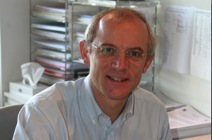The Brussels Branch
You will be redirected to the new LICR web pages in a few seconds...
|
The Brussels Branch of the Ludwig Institute for Cancer Research Ltd specializes in cancer immunology and cancer genetics. Created in 1978, the Brussels
Branch is now led by Dr Benoît Van Den
Eynde, Branch Director.
|
 |
The achievement the Brussels Branch is most renowned for is to have demonstrated the existence of antigens on cancer cells and to have defined those tumor antigens at the molecular level. These antigens are recognized by cytolytic T lymphocytes and consist of small peptides presented by class I molecules of the Major Histocompatibility Complex (MHC). The peptides derive from proteins that are present in tumor cells and absent in normal cells.
This landmark discovery has allowed the development of cancer immunotherapy, a new therapeutic approach that currently holds great promise and has seen the FDA approval of its first two products in the year 2011.
Current work at the Brussels Branch includes further studies on tumor antigens and their mechanism of production by tumor cells, and further development of immunotherapy approaches, both at the preclinical and clinical level. Efforts focus on studying the mechanisms of tumoral resistance to immune rejection, and developing strategies to overcome such mechanisms.
Another line of research studies oncogenic mutations in haematological malignancies, including the JAK2 mutation that is frequently observed in Polycythemia Vera and was partly discovered at the Branch.
Lastly, the Brussels Branch also studies the function of several cytokines, particularly IL-9 and IL-22, which have been discovered at the Branch. Their role in normal and pathological processes is evaluated.
Benoît
Van den Eynde, Director
Brussels, November 12, 2012
